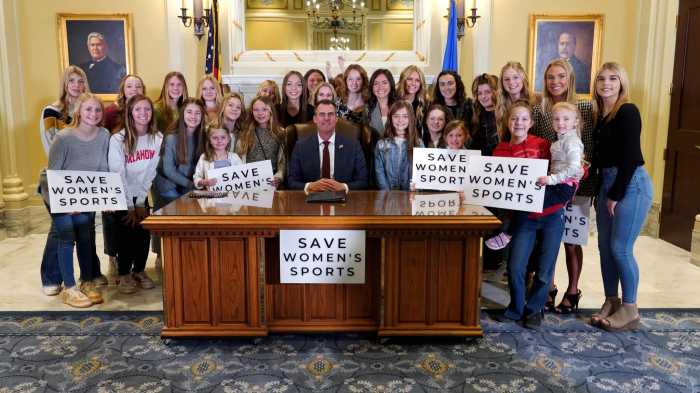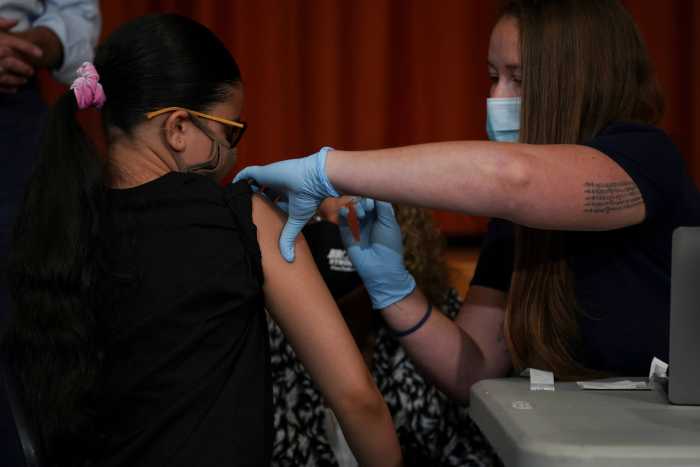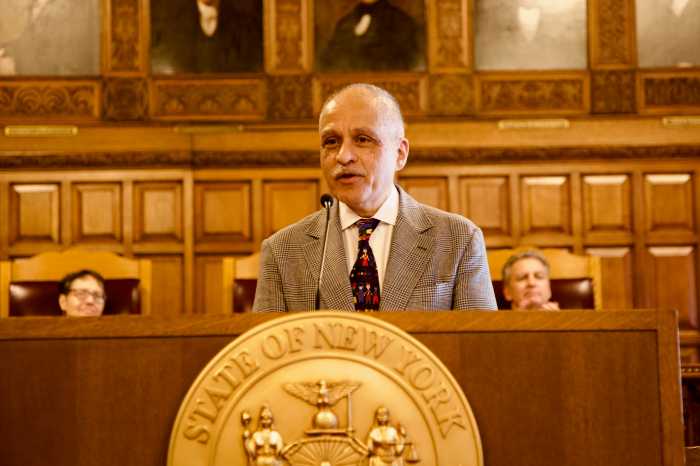On May 13 the Texas Supreme Court and the US District Court for the Middle District of Alabama issued opinions approving temporary injunctive relief to partially block enforcement of state policies or laws against parents or health care professionals who provide gender-affirming care for minors, giving plaintiffs challenging those laws a partial victory.
However, in both cases the plaintiffs did not get all the temporary relief they were seeking to forestall application of the laws while their challenges were proceeding in the courts.
In Texas, after the legislature had rejected a proposal to amend the law to add certain forms of gender-affirming treatment to the definition of “child abuse,” Attorney General Ken Paxton issued an opinion letter on February 18 stating that providing such treatment was “child abuse” under an existing statute. Two days later, Governor Greg Abbott sent a letter to Commissioner Jaime Masters of the state’s Department of Family and Protective Services (DFPS), echoing Paxton’s conclusion and stating that “DFPS and all other state agencies must follow the law as explained in OAG Opinion No. KP-0401.”
DFPS quickly issued a statement: “In accordance with Governor Abbott’s directive today to Commissioner Masters, we will follow Texas law as explained in Attorney General Opinion KP-0401.”
DFPS then promptly suspended one of its own employees, the mother of a transgender teenager, and launched an investigation into her and her husband. In addition, under the law governing “child abuse,” health care providers who learn of child abuse are obligated to report to DFPS. In the following days, there were reports that investigations of other families had begun.
The mother and father, proceeding as Jane and John Doe, their daughter Mary Doe, and a Texas physician who provides gender-affirming care, jointly filed a lawsuit in state court in Austin, seeking a declaratory judgment that this sudden change in the law was invalid, and an order barring the governor and DFPS from carrying it out. A trial judge in Austin granted them a restraining order, which she then expanded into a temporary injunction, barring any attempt by the governor or DFPS to apply this new interpretation of the law to anyone while the case is pending. The state immediately appealed, which had the effect under Texas law to “supersede” the trial court’s temporary injunction, placing the issue of temporary relief before the court of appeals. Under Rule 29.3 of the Texas Rules of Appellate Procedure, that court reaffirmed the trial judge’s temporary injunction in full.
The state then filed a Petition for a Writ of Mandamus in the nine-member Texas Supreme Court, seeking relief from the temporary injunction. (A writ of mandamus would be an order to the lower court.) One justice did not participate in this ruling.
The politics of the situation can’t be ignored. The elected trial judge in Austin and the elected Court of Appeals panel are Democrats. The Texas Supreme Court is made up of nine Republicans, all initially appointed either by former Governor Rick Perry or Governor Abbott, subject to re-election on a statewide basis. Democrats can win elections in Austin, a liberal city, but have not won any statewide elections in a long time.
On May 13, the eight participating members of the Texas Supreme Court unanimously concluded that Rule 29.3 limits the power of the Court of Appeals to adopt the trial court’s injunction in full. According to the portion of the opinion by Justice Jimmy Blacklock, “Rule 29.3 authorizes courts of appeals, during an interlocutory appeal, to ‘make any temporary orders necessary to preserve the parties’ rights until disposition of the appeal.’” This means, according to the court, that while the appeal was pending from the trial court’s grant of the temporary injunction, the court of appeals could only issue an order protecting the rights of the parties to the lawsuit, and not an order affecting any non-parties.
Furthermore, the court pointed out that neither Paxton nor Abbott have the authority to issue binding opinions on state law, and Abbott has no direct role in supervising the DFPS in its investigatory and law enforcement activities. As a result, said the court, there was no basis for that portion of the temporary injunction to restrict Abbott’s activities.
The court also pointed out that DFPS has always had authority to investigate potential cases of child abuse, but that it could not take any formal action against parents or health care providers without getting a court order. Ultimately, it will be up to Texas courts to decide whether providing gender-affirming care is “child abuse,” not Paxton or Abbott or even, ultimately, DFPS.
The result is that the portion of the temporary injunction that bars DFPS from investigating or taking any action against John or Jane Doe or the plaintiff doctor will remain in effect, but that this order does not block DFPS from initiating and pursuing investigations of others who are “suspected” of “child abuse.” On the other hand, DFPS is not bound by the governor’s “directive” to do so, since the governor had no authority to issue such a directive in the first place. Unlike the US President or governors of most other states, Texas governors have limited executive power, and it specifically does not extend to overseeing the operation of DFPS or directing that agency about how its governing statutes are to be interpreted.
Justice Blacklock and Justices John P. Devine and Jeffrey S. Boyd dissented from the portion of the opinion that would effectively bar DFPS for investigating “the possibility of harm to the plaintiffs’ child.” He pointed out that DFPS has the general authority to receive reports of suspected child abuse and to investigate them, and it should be up to DFPS to exercise its discretion in deciding whether to carry out an investigation.
In an opinion concurring with the majority of the court, Judge Debra Lehmann emphasized this point, although she agreed with the court’s opinion to the extent that it would block an investigation of the plaintiffs that was triggered solely to comply with the governor’s invalid “directive.”
The bottom line of the opinion, as summarized by Justice Blacklock, is that “we are left with (1) a court of appeals order that protects only the plaintiffs as against DFPS and its Commissioner’s action, and not as against the Governor; (2) a non-binding Attorney General Opinion; (3) a non-binding statement by the Governor; and (4) a state agency, DFPS, with the same discretion to investigate reports of child abuse that it had before issuance of OAG Opinion No. KP-0401 and the Governor’s letter.” DFPS announced that it was “studying” the decision, before deciding whether to continue or initiate more investigations.
Presumably, anybody who is targeted for an investigation solely for providing such care to a minor could go into court and seek injunctive relief, and the Austin trial judge’s opinion would stand as a persuasive precedent. Similarly, health care providers who are under a statutory due to report child abuse, other than the co-plaintiff in this case, could cite this litigation as a defense if they were pursued by law enforcement for not making such reports.
In Alabama, Governor Kay Ivey signed the “Alabama Vulnerable Child Compassion and Protection Act” into law on April 8. Two lawsuits were quickly filed in federal court challenging the act, one in the Northern District of Alabama and the other in the Middle District. Eventually the suits were consolidated in the Northern District, withdrawn, and refiled with a new set of plaintiffs. Over the course of this procedural maneuvering, the case bounced around among various district judges until it ended up before District Judge Liles C. Burke, who was appointed by former President Donald Trump and took the bench in 2018, having been confirmed on a party-line vote in the Senate.
In his May 13 opinion, Judge Burke was concerned mainly with Section 4(a)(1)-(3) of the Act, which makes it a Class C felony for health care providers, with respect to a person under age 19, to prescribe or administer puberty blockers or hormones as gender-affirming care for minors diagnosed with gender dysphoria. Other subsections of Section 4(a) prohibit surgical alteration for minors as a form of gender-affirming care. A different section, Section 4(c), makes it illegal for school officials to “encourage or coerce” a minor to withhold from their parent or guardian the information about their gender identity beliefs, or to withhold that information from the parents of a minor.
Having concluded that “there is a substantial likelihood that Section 4(a)(1)-(3) is unconstitutional,” Judge Burke enjoined the state from enforcing that portion of the Act pending trial. However, he specified that he was not enjoining the ban on surgical alteration or the provisions requiring school authorities to inform parents about their children’s gender identity beliefs.
Judge Burke’s opinion is mainly devoted to analyzing the constitutional issues raised by Section 4(a)(1)-(3), and does not go into any detail about why he is not enjoining the other provisions at this point. He finds that the US Supreme Court has long recognized a fundamental right of parents to make decisions about their children, including their medical care, and he was unconvinced by the state’s argument that it had the authority to intervene based on the idea that puberty-blockers and gender-affirming hormone treatment was “experimental” and “dangerous” to the degree that the state should outlaw their provision to minors. He was apparently very impressed by the great weight of professional medical authority, repeatedly observing that 22 major professional associations (in an amicus brief) had shown that such treatments are hardly experimental at this point, and that these treatments have long been used in situations that did not involve gender transition but addressed other issues in adolescent development, without untoward effects.
Judge Burke found that there was no evidence that anybody was “forcing” gender-affirming treatment on minors, summarizing the evidence showing that lengthy and in-depth diagnostic process that would precede any such treatment.
The judge also recognized the equal protection claims of transgender children, who would be denied treatments that the medical professionals agree are necessary treatments in some cases of gender dysphoria. Referring to the Supreme Court’s 2020 decision in Bostock v. Clayton County, ruling that discrimination because of a person’s transgender status is a form of discrimination because of sex, he noted that the 11th Circuit Court of Appeals, whose jurisdiction includes Alabama, has applied heightened scrutiny to government polices that discrimination based on gender identity. He rejected the state’s argument that this law is not discriminatory, pointing out that only transgender youth are denied these treatments which are available to non-transgender youth to deal with other issues, such as hormone deficiencies or premature puberty.
The state presented an “expert witness” from Canada, who was ultimately shown through cross-examination to have no real direct expertise, and who conceded so many of the plaintiffs’ points that the court gave his testimony little weight.
The Biden Administration was permitted to file a brief in support of the plaintiffs and participate in the oral argument at the hearing on the motion for preliminary relief, but the court ultimately rejected its argument that under Section 1557 of the Affordable Care Act (ACA), the state’s law was preempted by federal policy. Section 1557, Judge Burke found, was concerned with discrimination by health care providers, not discrimination by the state defendants. He also rejected the plaintiffs’ arguments that the statute was unconstitutionally vague or impermissibly restricted freedom of speech.
Having concluded plaintiffs were likely to succeed in proving their due process and equal protection claims, the court found that failing to block Section 4(a)(1-3) would irreparably injure transgender minors by requiring termination of their ongoing treatment and delaying the initiation of such treatment when it was prescribed by their health care providers. He also found that the interest of the plaintiffs outweighed the state’s interest in enforcing those provisions, and that the public interest was served by protecting the constitutional rights of the plaintiffs.
The provision restricting surgery remains in effect, but is largely symbolic since the standards for gender-affirming care published by the World Professional Association for Transgender Healthcare (WPATH), widely acknowledged by many courts as setting the professional standards on these issues, provide that surgery, which is irreversible (unlike puberty blockers or hormone treatments) should be delayed until at least age 18. More serious is the court’s decision, without any discussion, to leave intact the provisions about notification of parents. Presumably, but unspoken, the judge believed that if parents have a constitutional right to make health care decisions for their children, they would also have a right to know that their children are dealing with gender identity issues. These questions will, however, be addressed further as the case proceeds to the merits. This opinion is solely concerned with preliminary relief pending a trial on the merits.


































